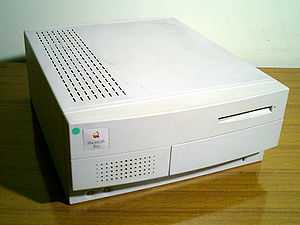Macintosh IIvx
 |
| Release date |
October 19, 1992 |
|---|
| Introductory price |
US$2,950 |
|---|
| Discontinued |
October 21, 1993 |
|---|
| Operating system |
System 7.1, System 7.1.1-Mac OS 7.6.1 |
|---|
| CPU |
Motorola 68030 @ 32 MHz |
|---|
| Memory |
4 MB, expandable to 68 MB (80 ns 30-pin SIMM) |
|---|
The Macintosh IIvx (code name Brazil) is the last of the Macintosh II series of Macintosh computers from Apple Computer. The IIvx included either a 40, 80, 160 or 400 MB hard drive, three NuBus slots, and a Processor Direct Slot. It was the first Macintosh to have a metal case and the first case design of any personal computer to provide for an internal CD-ROM drive.[1][2] An internal double speed CD-ROM drive which used a disc caddy was available as an option from Apple.
History
The Mac IIvx began its life in development as a proof-of-concept to see how an internal CD-ROM drive could be added to a Mac. But after Apple CEO John Sculley gave a speech at MacWorld Tokyo which promised a Mac with a CD-ROM drive, the IIvx was rushed into production.[3] Several shortcuts were taken in its design; most notably, its 32 MHz processor was crippled by a 16 MHz bus, making it slightly slower than the popular but aging Macintosh IIci.[4] Its serial port was limited to 57.6 kbit/s, which could cause problems with serial connections and MIDI hardware. The Macintosh IIvi (a slower version of the IIvx with a 16MHz processor) was introduced at the same time but discontinued only four months later. The high-end member of the original Performa family, the Performa 600 was also based on the same architecture. The IIvx was the only model in the series with a 32K L2 cache.
Industrial design
The Macintosh IIvx has the same chassis as the Centris 650 (later known as the Quadra 650). It can be upgraded to this machine by a simple logic board swap.
Legacy
The much-more-powerful Macintosh Centris 650 was released four months after the IIvx for $250 less, immediately rendering the IIvx obsolete. The IIvx's base price was slashed by over a third and it would remain on sale for another eight months.[4] For a while afterwards, people who bought an expensive Mac that quickly became outdated were said to have been "IIvx-ed".[3]
References
External links
|
|---|
| | Computers |
Apple | |
|---|
| | |
|---|
| | |
|---|
| Macintosh LC | |
|---|
| | |
|---|
| | |
|---|
| | |
|---|
| Miscellaneous | |
|---|
|
|---|
| | Peripherals |
| |
|---|
| External drives | |
|---|
| Input devices | |
|---|
| Networking | |
|---|
| | |
|---|
| | |
|---|
| Other | |
|---|
|
|---|
|
Apple hardware since 1998 |
|
